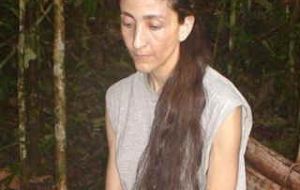MercoPress. South Atlantic News Agency
Colombia offers jailed rebels for Ingrid Betancourt
 Growing concern about the health of Ingrid Bentancourt
Growing concern about the health of Ingrid Bentancourt The Colombian government has offered to suspend the sentences of hundreds of rebel fighters from FARC if it frees Ingrid Betancourt, a captive French-Colombian politician, and other hostages.
The move was an attempt to push through an exchange after months of dispute over conditions, said Luis Carlos Restrepo, Colombia's peace commissioner during a press conference in Government House, Palacio Nariño. "The immediate release of Betancourt would be enough for us to consider the humanitarian exchange under way, in that we would conditionally suspend the sentences of guerrillas who are part of the agreement" announced Restrepo. He said that the Colombian government, under President Alvaro Uribe, was not placing a limit on the number of prisoners it could release and had "reduced to a minimum" its conditions for the swap. There has been increasing concern in recent weeks over Ingrid Betancourt's ill health who has become the symbol of hundreds of hostages held by the Marxist oriented cocaine funded Colombian Revolutionary Armed Forces, FARC. France together with several European and Latinamerican countries and United Nations have tried so far unsuccessfully to obtain her release. Betancourt is one of around 40 high-profile hostages, including three American defense contractors, whom FARC wants to exchange for 500 people held in Colombian prisons. The only condition from the Colombian government is that in return for the hostages' freedom, those FARC fighters released would have to promise not to return to the ranks of the rebel group. "The government has joined the national and international cry that the life of Ingrid Betancourt be saved. We cannot run risks in this case and there is no more time to wait" insisted Restrepo. Wolmar Perez, the Colombian human rights ombudsman revealed on Thursday that the government had obtained reports that Betancourt, who was captured by the group six years ago, was in "very, very delicate" health, suffering from malnourishment and possibly hepatitis B. FARC reportedly took her for treatment to a first aid station in a jungle town controlled by FARC in March, Perez said. Although Betancourt remains as FARC main bargaining chip, if her condition worsens and anything should happen to her, FARC could be blamed by the world who is watching her plight closely. France has urged FARC to accept the offer from Bogota. "We call on the FARC to seize without delay this opportunity at a crucial moment," Frederic Desagneaux, foreign ministry deputy spokesman, said. "She must urgently be freed." In related news the Colombian Defense Ministry said this week it was investigating whether 66 pounds of uranium found buried by a roadside in southern Bogota was material being sought by the FARC group. Colombian authorities said earlier this month that they were worried by a document found in the laptop of a slain rebel that indicated the guerrillas were trying to obtain uranium. It wasn't clear, Vice President Francisco Santos said at the time, whether the rebels sought to create a radioactive weapon. The document made it appear as if the insurgents were seeking to resell uranium at a profit. The two uranium chunks found Wednesday were described by Colombia's military chief as "impoverished." Only uranium enriched through processing, something most countries, including Colombia, are not equipped to do, can be used to make nuclear weapons or power reactors. Two informants who had contact with a Bogota arms dealer led authorities to the uranium, said Sgt. Elizabeth Filigrana, a spokeswoman for armed forces chief Gen. Freddy Padilla. Their identities were not made public.




Top Comments
Disclaimer & comment rulesCommenting for this story is now closed.
If you have a Facebook account, become a fan and comment on our Facebook Page!